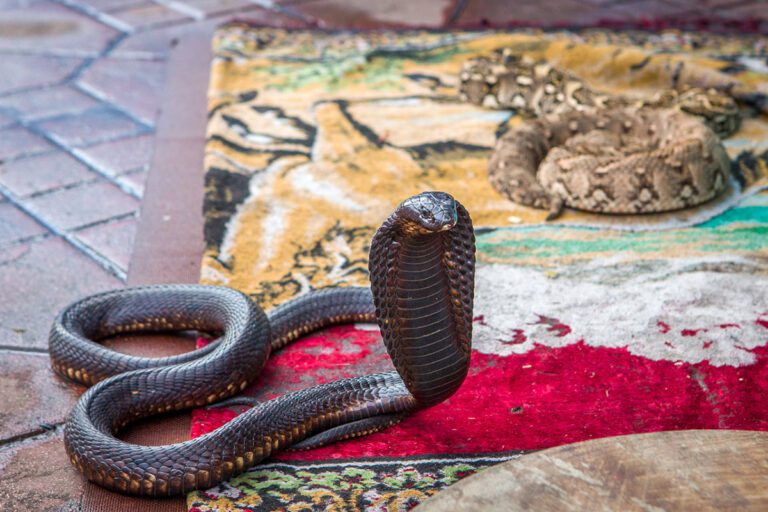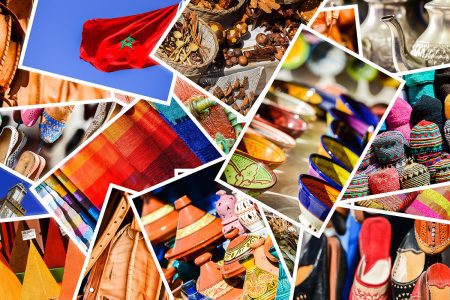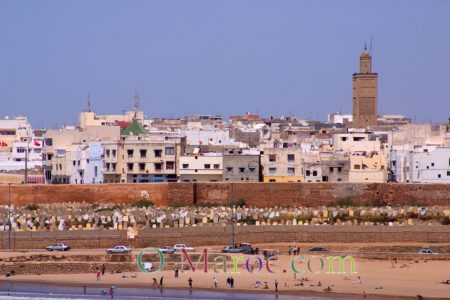An email is currently circulating on the net, denouncing the use of animals by the snake charmers in Jemaa Fna square in Marrakesh.
Yes, these snakes are being mistreated
Yes, these animals are mistreated, and the idea is not to dispute this. Snake charmers, who claim to be members of the Isawiyya (a brotherhood with powers over these animals), are not concerned about their welfare, far from it. In Morocco, snakes are seen first and foremost as pests, and secondarily as ingredients for ‘magic’ formulas of all kinds.
What’s more, a number of species, between the merciless hunting by villagers and the reduction – as everywhere – of their natural habitat, are threatened, from ‘slightly‘ to ‘seriously‘.
Here are some extracts from the post:
In Marrakesh, the Jemaa-El-Fna square owes part of its fame to the traditional snake charmers. The imposture of their talent […] leads to the mistreatment of cobras, pit vipers, Montpellier snakes and others, in order to perpetrate a dubious medieval spectacle. Most of these beautiful species are either threatened with extinction in North Africa or are in alarming decline.
Once taken from the wild, these animals usually have their venomous fangs torn off, causing abscesses that lead to a slow, painful death. There are a few rare exceptions that confirm the rule […] These snakes […] are forced to adopt a systematically stressful defensive position, and die without exception of exhaustion after a few months, two or three at most. […] Many unfortunate cobras, viperids, Mauritanian vipers, Montpellier snakes and horseshoe snakes, ‘waiting’ to be sold, are kept for months on end in filthy boxes where many end up dying of thirst or starvation.
Unable to feed themselves, they are force-fed. Stressed by frequent manipulation or by being forced to adopt a defensive posture, they die very quickly after a short, moribund life in the service of greed and inhuman stupidity.
But what followed was less convincing
The questions asked in a very sincere plea don’t seem to me to be the right ones.
Why, then, do we see so many (far too many) foreign tourists, particularly French tourists, revelling in these deplorable spectacles? Why don’t we see them more often protesting against these abominations, illustrated on this square and in the adjoining souk by such shows and displays of animals? […] The stupid complacency of tourists is the only thing that has allowed such a massacre to go on for so many years. For how much longer?
Curious, how what seems to be unacceptable in France and Europe becomes acceptable in Morocco, in the name of a cultural relativism that is as suspect as it is dangerous. This is true of everything. Morocco must not become a country governed by the rule of law…
Yet this is to forget that where gains have been made, in France or elsewhere, they have been obtained after a long struggle. It is and remains true that oppression of any kind, including against those we conveniently call “animals”, or against women or men of other races, has been and remains, albeit unevenly, an evil that we see everywhere on this planet. […]
Tourists, please turn away from the disgraceful shows that mistreat animals, or better still, denounce them! Turn away from these trainers of little monkeys, tied up short and forced to perform appalling pirouettes. Turn away, too, from the sordid souk vendors selling live and dead animals, most of them protected species.
Place Jemaa-El-Fna has a police station, so don’t hesitate to express your indignation!
Misunderstanding Morocco, misunderstanding the real problems
I always feel uneasy when people who are indignant about the poor condition of working animals in Morocco don’t seem to think for a moment about the condition of their masters, the poverty of their lives, the destitution of their homes.
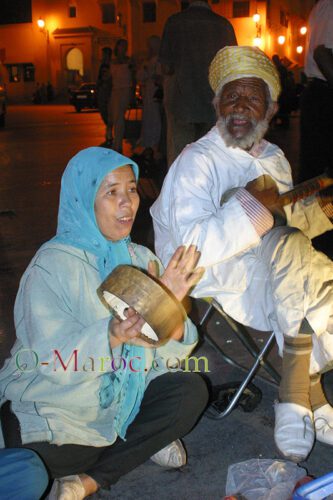 The Muslim religion is not cruel to animals. The Qu’ran even recommends that animals should not be made to suffer.
The Muslim religion is not cruel to animals. The Qu’ran even recommends that animals should not be made to suffer.
On the other hand, ignorance and poverty often combine to generate ill-treatment, the results of which we see much more easily on the donkey than the illness of its master, who has become diabetic from eating almost nothing but sweet tea, like many Moroccans.
Of course, we mustn’t be angelic, as everywhere there are those who are indifferent and cruel. Above all, there is a majority of Moroccans who treat their animals as tools, to the best of their knowledge and economic ability.
The second thing is the profound error of believing that these attractions are made for tourists, and that all it would take for them to stop is for them to turn away.
It bears repeating that snake handling is linked to the magical rites and powers of one of Morocco’s most famous brotherhoods, the Isawiyya, originating from Fez and Meknes, famous in particular for their exorcism by fire and their mastery of snakes.
The fake Isawiyya of the Jemaa Fna square are not there just for European tourists, but just as much for Moroccans. European tourists spend a few minutes there, but don’t let themselves be taken in by their power, because they have already known for a long time that the “charmer” has no real power.
Many Moroccans still believe this.
Solutions
The first thing is not to take part, whether in snake charmer attractions or other animal trafficking, such as turtles, geckos or iguanas….
The second thing is to explain why, and simply to provide information about the suffering of animals, the risks, and the fact that tourists will always prefer a country with its wildlife to one where animals are in cages.
[Edit 2015: Moroccans are gradually becoming more ecologically aware, and much more aware of what tourists want. This slow work of explanation is not totally useless, even if it feels like using a die to empty the sea].If I could see in Merzouga or Chigaga the oryx I admired in Namibia, it would be heaven on earth… Maybe one day it will be.
It’s the basic rule that animal protection must pay for itself. When snake charmers have more interest in ecological discovery tours, things will improve on their own.
On the other hand, I strongly advise against going to the police station to lodge a complaint.
The Moroccan police have other things to worry about, and the police and Moroccans will not appreciate tourists trying to dictate to them in their own country.
There are epidermal reactions to the former coloniser, and any intrusion into what are considered to be ‘internal affairs’ is more likely to lead people to cling to their traditions than anything else.
And finally, I would like to remind you that the life of a snake charmer is not without risk. The last charmer in Ouarzazate died a few years ago, on his way to unearth new snakes.

He also left behind some fairly young children.
Since then, no one has had the courage to take up his work again. “For what it’s worth”.
That’s the best way to protect animals, so that people can earn a better living by respecting them than by exploiting them.
Don’t do “that”: have your photo taken and then post it on Flickr…. don’t consume.
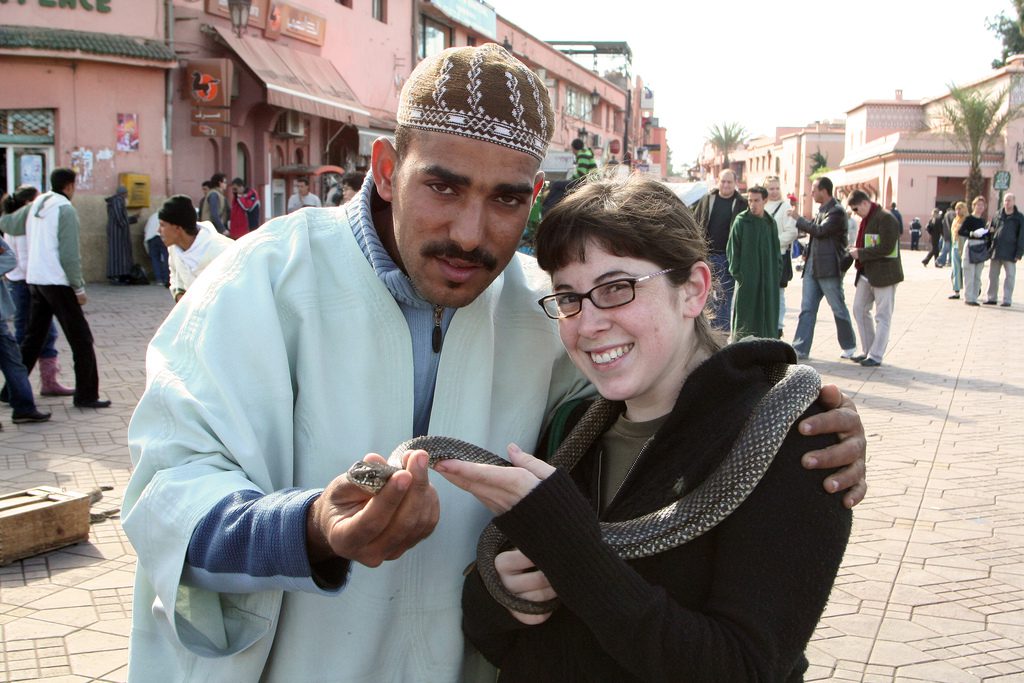
Michel Aymerich: naturalist and political activist, find out what he wrote
- Michel Aymerich's website
- Naturalist, wildlife photographer, militant for the animal cause and the human cause, Michel Aymerich's website (even if we didn't agree on the method - and I still don't - we agree on the substance).
- Capture of a cobra in Morocco: the "powers" of the Aissawas are not magic
- Michel Aymerich shows that the reactions of snakes, even supposedly aggressive ones, to human manipulation are accessible to everyone, not just to the baraka of the Aïssawas!
- About "Israel - Historical and geographical rights"
- for my part I write "Muslims" as others write "Germans" [After WWII]
This post from the "Islamism" category of Michel Aymerich's second blog shows his enormous a priori against Muslims in general. He brings out the old conspiracy arguments like Taqîya (which, curiously, he shares with the far right), talks about a situation for Moroccan Jews that doesn't correspond to reality (and he must have eaten his hat with the recognition of the State of Israel).
 A typo or syntax error? You can select the text and hit Ctrl+Enter to send us a message. Thank you! If this post interested you, maybe you can also leave a comment. We'd love to exchange with you !
A typo or syntax error? You can select the text and hit Ctrl+Enter to send us a message. Thank you! If this post interested you, maybe you can also leave a comment. We'd love to exchange with you !

